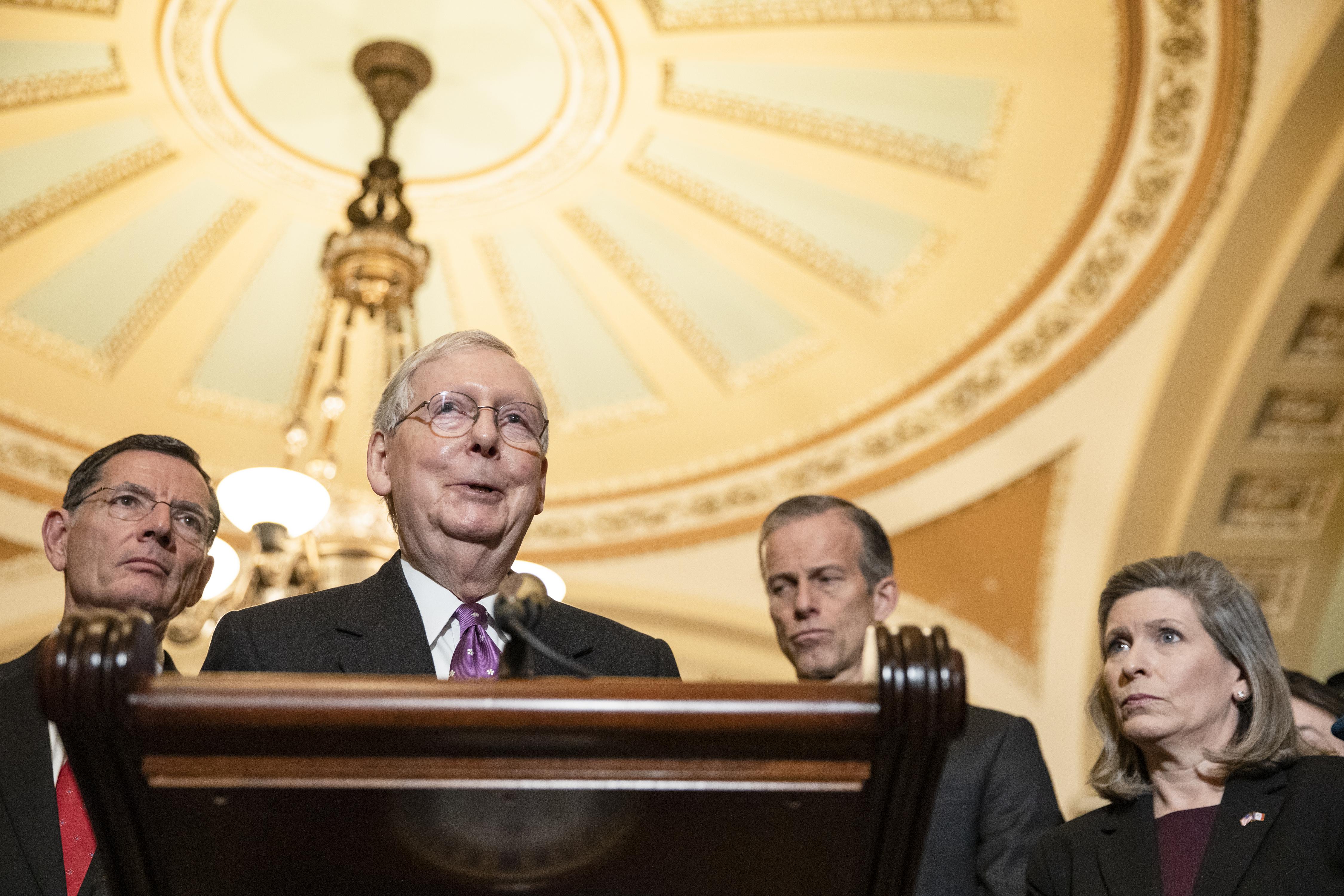For a brief, relieving moment on Wednesday, it appeared that Republicans in Congress might get on board with House Speaker Nancy Pelosi’s plan to combat the coronavirus pandemic. “I think the things that will be put forth will not be controversial and I think they could become very bipartisan,” House Minority Leader Kevin McCarthy told reporters.
The hopeful mood didn’t last. After Democrats unveiled their package late Wednesday night, GOP lawmakers whipped around and announced they would not in fact support the proposal, which they characterized as a sneaky plot to use a public health crisis to pass some long-standing liberal priorities. Senate Majority Leader Mitch McConnell called it an “ideological wish list” and accused House Democrats of choosing “to wander into various areas of policy that are barely related if at all to the issue before us.” Sen. Richard Shelby of Alabama complained that the House bill was covered in “Christmas tree ornaments.” An anonymous White House official said, “This is Democrats letting fear surrounding coronavirus be a vehicle to push their radical left agenda.” Trump echoed the point. “There are things in there that had nothing to do of what we are talking about,” he said, “It is not a way for them to get some of the goodies they have been able to get for the last 25 years.”
Trump didn’t specify what “goodies” he was talking about. Notably, neither did most of the other Republicans who have complained about the bill. This is worrisome, since it suggests that the GOP still doesn’t appreciate the scale of what the United States is facing, and views common-sense public health and economic measures as some sort “radical” leftist agenda.
The House bill is, in fact, a wide-ranging and fairly comprehensive response to the COVID-19 pandemic. It would guarantee free coronavirus testing by requiring insurers to pay for it and having Medicaid foot the full bill for the uninsured. It would add funding for unemployment benefits (since we’re probably going to see a lot of layoffs soon). It provides more food aid for families (a lot of kids are going to be without lunch when schools close). It would temporarily increase the federal government’s share of funding for Medicaid, to give state budgets a little relief as caseloads likely swell.
And importantly, it provides paid sick leave in two different ways. First, there’s an emergency benefit for workers affected by the coronavirus: The federal government will pay up to two-thirds of their usual earnings for as many as three months. Second, it would permanently require businesses to give workers seven days of paid sick leave, and an extra 14 during public health emergencies, with Washington covering the cost for small businesses.
These are all imminently sensible responses to the crisis at hand, which has shown that paid sick leave is an absolutely essential public health precaution. You want people to be able to get tested for this virus. You do not want them going to work and spreading an infection because they need to support themselves. You want people to be able to eat. You do not want consumer spending to crater.
And you should want to make paid sick leave permanent. It is demonstrably insane that we do not already require it. And it does not make any sense whatsoever for Congress to pass new, emergency paid leave mandates every time there is a public health crisis. Moreover, making sure that can people can take time off when they’re ill, even if there isn’t an emergency, will help prevent epidemics like this from occurring in the future.
Yet, Republicans are calling this some sort of radical, leftist plot, suggesting they still have no understanding of what it will take to address this crisis or prevent ones like it down the line.
To be fair, a few conservatives have voiced concrete objections to the plan, which could theoretically be addressed. Some are worried that it would impose new costs on employers, for instance. “It forces permanent paid sick leave for all businesses without exemptions and no sunsets,” McCarthy carped during remarks to reporters on Thursday. Sen. Lamar Alexander said in a speech Wednesday night that “the idea of paid sick leave is a good idea. But if Washington, D.C., thinks it’s a good idea, Washington, D.C., should pay for it.” Others, like McConnell and McCarthy, have suggested it would create too much new bureaucracy, since the emergency sick leave benefits would be run through the Social Security Administration.
Meanwhile, the White House has its own idiosyncratic set of sticking points. According to the Washington Post’s Jeff Stein, it doesn’t want to increase federal funding for Medicaid or for the program to cover the full cost of coronavirus testing; at the same time it’s complaining about those costs, it is pushing for an $840 billion payroll tax cut that almost nobody else in Washington believes is a good idea. The White House does appear to be on board with some kind of paid sick leave program but is hazy on details, and—based on Stein’s reporting—it apparently doesn’t want the bill to benefit victims of domestic abuse, a concern I won’t even try to unpack.
Pelosi might well be able to strike a deal overcoming these qualms. Maybe we’ll get a package that includes more federal funding for paid leave, or less Medicaid spending. But so far, the GOP is mostly showing that it’s wary of taking basic steps necessary to protect Americans’ health and the economy during this crisis. It should make you glad that Pelosi has been the one driving these negotiations, and not them.
